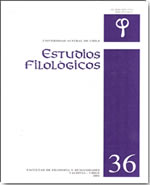Chilean toponymy: "the far-away possession"
Main Article Content
Abstract
The toponymy of Easter Island is almost completely dominated by names in Rapa Nui, the native language. This dominance has increased in spite of the Dutch, Spanish and English expeditions during the eighteenth century as well as the French religious missions, the slave raids from Peru , and the Chilean administration of the island during the following century. All of these, particularly the Spanish expedition of 1770, should have resulted in the extinction of the Rapa Nui toponymy, as has happened with other native languages in Chile. Quite the contrary, many native place names were already established by the middle of the nineteenth century; under Chilean administration there has been an increase in the vernacular place names, to such an extent that the latter are dominant at present. The survival of Rapa Nui as a living language is just one of the factors accounting for this dominance.

